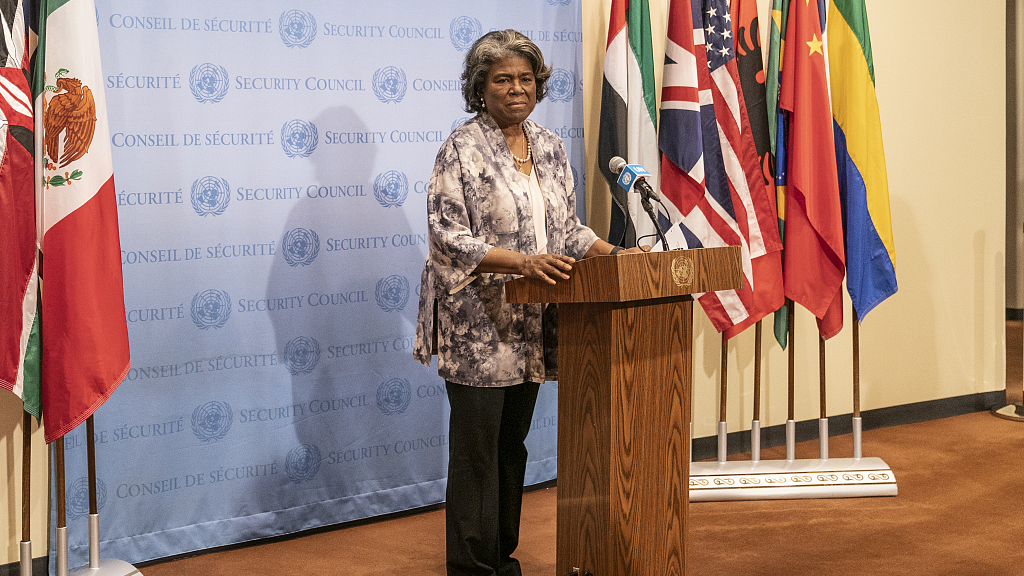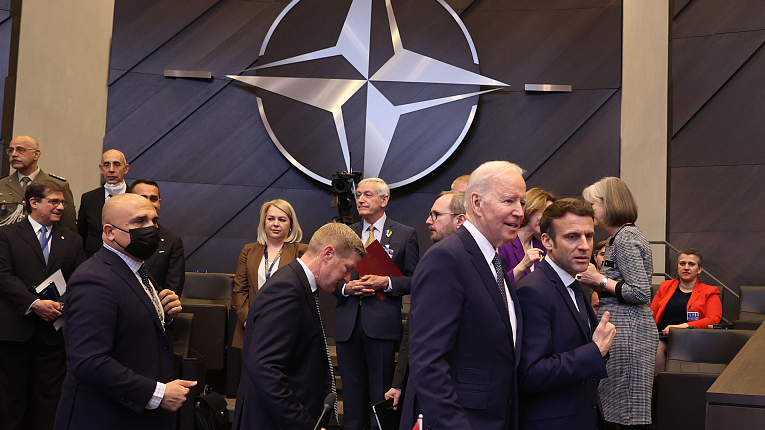
U.S. Ambassador Linda Thomas-Greenfield speaks to the media after the conclusion of the 11th Emergency Special Session of the General Assembly at UN headquarters in New York City, March 24, 2022. /VCG
U.S. Ambassador Linda Thomas-Greenfield speaks to the media after the conclusion of the 11th Emergency Special Session of the General Assembly at UN headquarters in New York City, March 24, 2022. /VCG
Editor's note: Hayat Bangash is a freelance columnist on international affairs with degrees in business administration and war studies. The article reflects the author's opinions and not necessarily the views of CGTN.
The United Nations General Assembly passed a resolution last week asking for humanitarian aid access in Ukraine. Although it was passed by the majority, a sizable number of countries did abstain from voting in its favor. Prominent among those who abstained include China, Pakistan, Iran, and India along with several Central Asian states.
These countries come from the developing world and they have one thing common among them: a desire to pursue independent foreign policies. Many among them are in the larger neighborhood of Ukraine and are already seeing the consequences of the crisis spilling over from the conflict zone.
Improvement of the humanitarian situation in Ukraine is in their common interest, yet they abstained from voting only to avoid the bloc politics that are not allowing pacification of the crisis.
The reliance on the UN as a platform to address international problems is a welcome modus. But it was equally unfortunate to see some parts of the resolution in question stepping beyond the humanitarian context. Those who abstained could see through the humanitarian effort being used as a cover for political manipulation.
The UN is the best multilateral body humanity has built so far. If its charter is adhered to in its true letter and spirit, it can solve most of the problems of the world. When its efforts are unduly politicized instead, a civilized response cannot be generated to address conflicts and reduce the suffering of the common people.
The countries that abstained from voting need to be particularly appreciated. For they are resisting the resurgence of the Cold War mentality of the West dividing the world into two blocs.

U.S. President Joe Biden (front L) and French President Emmanuel Macron (front R) attend the Extraordinary Summit of NATO Heads of State and Government in Brussels, Belgium, March 24, 2022. /VCG
U.S. President Joe Biden (front L) and French President Emmanuel Macron (front R) attend the Extraordinary Summit of NATO Heads of State and Government in Brussels, Belgium, March 24, 2022. /VCG
Spearheading this division is the North Atlantic Treaty Organization (NATO), a major remnant of the Cold War. Back then it was formed to counter the Soviet Union and today, with its constant supply of weaponry and ammunition into Ukraine, it is making the handling of the humanitarian problem a lot more difficult.
At the same time, many NATO members are pushing the rest of the world to take a side in the conflict despite the fact that most countries have independent relations both with Russia and Ukraine.
The ongoing conflict is not a simplistic black or white problem. It has a complex historical context with sovereignty concerns of one side and security concerns of the other.
The doctrine of "with us or against us" cannot be revived in such a situation as it will exacerbate the devastation it has already caused in the past two decades. The countries that rallied behind the U.S. sacrificed their long-term interests because they were only presented with a binary choice.
And when the pretexts of these American-led wars came out to be false, such countries were left with their faces red and their coffers light. Today they are much more careful in becoming parties to others' conflicts.
Pressure tactics are once again at hand to throw the world into distinct political blocs. The effect is more profound for the developing world which, apart from some exceptions, has been slow in standing on its feet in the post-colonial era. The more the developing countries want to become independent in their foreign policies, the more they are pushed to pick a side.
With the presidency of Joe Biden, calls gained momentum for upholding the "rules-based international order" – a concept that has remained elusive ever since its inception. Initially used for the critique of Republicans in the U.S., it is now being employed as an ambiguous alternative to international law and for justifying actions that are tantamount to bullying sovereign nations.
Biden has been harping on building partnerships and alliances, but when American partners fall out of line, they are treated with disparagement and denigration.
One American partner that is the target of Washington's ire is India which also abstained from voting for the humanitarian resolution. After a flurry of diplomatic activity failed to convince India to pick a side, Biden has come out publicly calling the Indian response as shaky and the country as an exception in the American alliance.
Not to mention India's western neighbor Pakistan that maintains a careful balance in its relations with the West and the East. In the global war on terror, it was a major non-NATO ally and uses a mix of American, Chinese and Russian military hardware. But its independent stance in the ongoing Russia-Ukraine conflict was unduly targeted when ambassadors of European countries wrote a joint letter to the Pakistani government to vote against Russia at the UN.
China is also commendably maintaining an impartial stance on the issue. It has remained proactive and is sending emergency humanitarian aid to Ukraine. While welcoming the coordination role of the UN, it has put forward a six-point aid initiative, in line with UN resolution 46/182 and under principles of humanity, neutrality, and impartiality.
The most immediate need right now is a ceasefire, followed by a flow of humanitarian aid faster than the flow of arms into the region. If political tactics like those observed in the passing of the UN resolution for humanitarian aid are not avoided, the solution to this conflict will continue to elude and the world will, in the meantime, continue to divide into polarizing blocs.
(If you want to contribute and have specific expertise, please contact us at opinions@cgtn.com. Follow @thouse_opinions on Twitter to discover the latest commentaries in the CGTN Opinion Section.)

